Related Research Articles
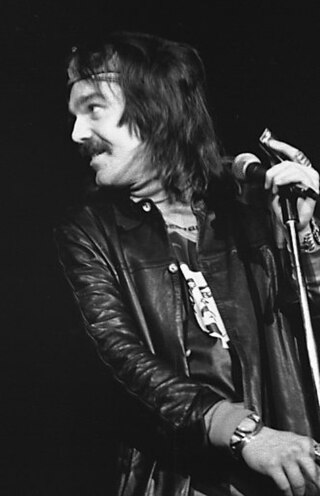
Don Van Vliet was an American singer, songwriter, multi-instrumentalist, and visual artist best known by the stage name Captain Beefheart. Conducting a rotating ensemble known as the Magic Band, he recorded 13 studio albums between 1967 and 1982. His music blended elements of blues, free jazz, rock, and avant-garde composition with idiosyncratic rhythms, absurdist wordplay, a gravelly voice, and a wide vocal range. Known for his enigmatic persona, Beefheart frequently constructed myths about his life and was known to exercise an almost dictatorial control over his supporting musicians. Although he achieved little commercial success, he sustained a cult following as an influence on an array of experimental rock and punk-era artists.

Lawrence Wayne "Wild Man" Fischer was an American street performer known for offering erratic, a cappella performances of "new kinds of songs" for a dime on the beaches and the Sunset Strip in West Hollywood. Most of his life was spent homeless or institutionalized, and he later became regarded as "the godfather of outsider music".
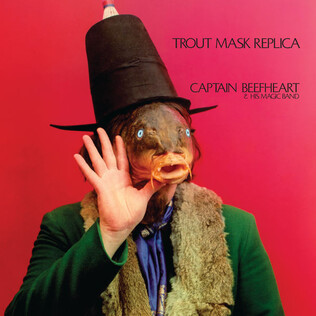
Trout Mask Replica is the third studio album by the American band Captain Beefheart and his Magic Band, released as a double album on June 16, 1969, by Straight Records. The music was composed by Captain Beefheart and arranged by drummer John "Drumbo" French. Combining elements of R&B, garage rock, and blues with free jazz and avant-garde composition, the album is regarded as an important work of experimental rock. Its unconventional musical style, which includes polyrhythm, multi-octave vocals, and polytonality, has given the album a reputation as one of the most challenging recordings in the 20th century musical canon.

Straight Records, self-identified simply as Straight, was a record label formed in 1969 to distribute productions and discoveries of Frank Zappa and his business partner/manager Herb Cohen. Straight was formed at the same time as a companion label, Bizarre Records. Straight and Bizarre were manufactured and distributed in the U.S. by the Warner Bros. Records family of labels, which also included Reprise Records. Straight recordings were distributed in the U.K. by CBS Records.

The Persuasions were an American a cappella group that formed in Brooklyn, New York in 1962, singing under corner streetlights and in subway corridors. Their style combined gospel, soul, early rock, and jazz into melodic five-part harmonies. Since being discovered by Frank Zappa, the Persuasions have released 23 studio albums to date.
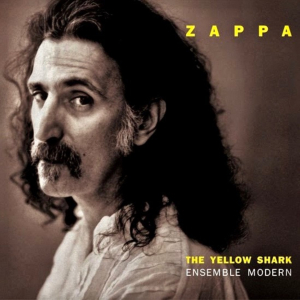
The Yellow Shark is an album of orchestral music by American musician Frank Zappa. Released in November 1993, it was the last album Zappa released in his lifetime, almost exactly a month before he died of the cancer from which he had suffered for several years. It features live recordings from the Ensemble Modern's 1992 performances of Zappa's compositions. In the album's notes, Zappa describes The Yellow Shark as one of the most fulfilling projects of his career, and as the best representation of his orchestral works.
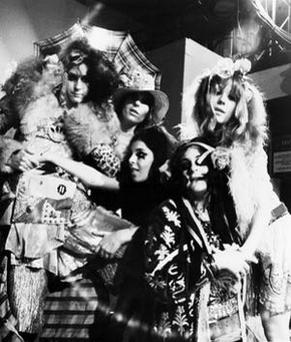
The GTOs were an all-girl group from the Los Angeles area, specifically the Sunset Strip scene. The group was active for two and a half years (1968–1970), followed by one reunion performance in 1974. Their only album, Permanent Damage, was produced by Frank Zappa and released in 1969.

Ice Cream for Crow is the twelfth and final studio album by Captain Beefheart and the Magic Band, released in September 1982. After it was recorded, Don Van Vliet retired from music to devote himself to a career as a painter. It spent two weeks in the UK album charts, reaching number 90, but failed to make the Billboard Top 200.
Charles Edward Weiss was an American songwriter and vocalist. A fixture on the Los Angeles scene, Weiss was known for an eclectic mix of blues, beat poetry, and rock and roll. His music included strains of every rhythmic style from nursery rhymes to zydeco.
Mike Miller is an American rock and jazz guitarist. He has worked with Chick Corea, Bette Midler, Yellowjackets, Brand X, Burton Cummings, Vinnie Colaiuta, Quincy Jones, Gino Vannelli, and Vital Information.

The Lost Episodes is a 1996 posthumous album by Frank Zappa which compiles previously unreleased material. Much of the material covered dates from early in his career, and as early as 1958, into the mid-1970s. Zappa had been working on these tracks in the years before his death in 1993.
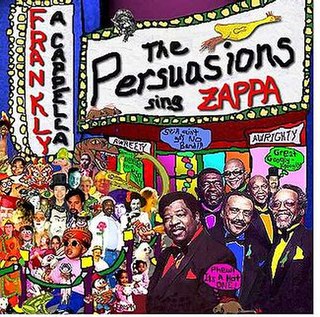
Frankly A Cappella: The Persuasions Sing Zappa is a 2000 album by the singing group The Persuasions. Frank Zappa heard them over the phone while they were singing in a record shop on the East Coast and flew them out to L.A. to record their first LP, in 1969, for Zappa's label. The album was the brainchild of Rip Rense, a friend of Zappa, as a tribute to the late composer. Rense executive produced and worked with lead singer/arranger Jerry Lawson on selecting the tracks and guest artists, who included Zappa alums Bruce Fowler, Robert Martin, Mike Keneally. Gary Mankin and Lawson co-produced the music, and Gail Zappa had final approval of the project. All arrangements by Jerry Lawson. The album is the first of several in which The Persuasions paid tribute to the songs of a specific group or artist.
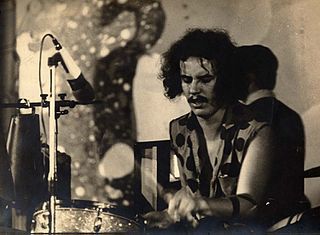
Arthur Dyer Tripp III is an American retired musician who is best known for his work as a percussionist with the original version of Frank Zappa's band the Mothers of Invention during the 1960s and Captain Beefheart and his Magic Band during the 1970s. Thereafter, Tripp retired from music. He attended an accredited chiropractic college in Los Angeles from 1980 through 1983, graduating with his Doctor of Chiropractic degree and later practising in Gulfport, Mississippi.
Zoogz Rift was an American musician, painter and professional wrestling personality.
Jerome Eugene Lawson was an American singer, producer, musical arranger and performer, best known as the original lead singer of the Persuasions.
Arthur F. Rense was a sports journalist for the Los Angeles Daily News and the director of public relations for Howard R. Hughes' Summa Corporation.

Adelaide Gail Zappa was the wife of musician and composer Frank Zappa and the trustee of the Zappa Family Trust. They met in Los Angeles in 1966 and married while she was pregnant with their first child, Moon, followed by Dweezil, Ahmet and Diva. Gail was also the aunt of model and actress Lala Sloatman.
Moris Tepper, sometimes credited as Jeff Moris Tepper, is an American singer-songwriter, guitarist and artist.

"My Guitar Wants to Kill Your Mama" is a song written by Frank Zappa and originally recorded by The Mothers of Invention in February 1969 at Criteria Studios (Miami), with overdubs recorded sometime between August and September 1969 at TTG Studios and Whitney Studios. This version was included on their 1970 album Weasels Ripped My Flesh, an LP that included various recordings by the band from 1967 to 1969. A second version was released as a single on the Bizarre and Reprise labels as "My Guitar." Despite the more conventional naming, "My Guitar" did not chart.
Scott David Wannberg was an American poet. His work was considered one of the anchors in the Los Angeles poetry scene. As a poet he wrote primarily in what would be considered stream of consciousness, rarely editing any of his work until late in life. His work was informed by music, film and beat poetry. He worked as a clerk at Vroman's Bookstore on the Third Street Promenade, and at Dutton's Brentwood. Wannberg was a founding member of the traveling poet troupe known as the Carma Bums. His works include Nomads of Oblivion, Strange Movie Full of Death, and Tomorrow Is Another Song. He died of a heart attack on August 19, 2011, at the age of 58.
References
- 1 2 3 Johnson, Brett (June 4, 2007). "A writer looks back in prose, to a young Thousand Oaks". Ventura County Star . Archived from the original on 14 December 2014. Retrieved December 11, 2014.
- ↑ Rense, Rip (May 12, 2002). "Deciphered: A Demonic Prelude by an Ailing Chopin". The New York Times . Retrieved December 11, 2014.
- ↑ Rense, Rip (26 May 1985). "Beatles Album Travels a Long and Winding Road to Release". Chicago Sun-Times .
- ↑ Rense, Rip (August 21, 2005). "One More Beatles Song, or Should They Just Let It Be?". The Washington Post . Retrieved December 11, 2014.
- 1 2 Rense, Rip (September 13, 1986). "Westwood One's Music Marketing: Media-Driven Tour Sponsorships". Billboard . p. 37. Retrieved December 11, 2014.
- 1 2 "Rip Rense: Credits". AllMusic . Retrieved December 11, 2014.
- ↑ "Rip Rense". Artist Direct . Retrieved December 11, 2014.
- 1 2 Staff writer (January 5, 1991). "Arthur F. Rense, Public Relations Executive, 74". The New York Times . Retrieved December 13, 2014.
- 1 2 3 4 Roderick, Kevin (June 4, 2007). "Rip Rense goes home again". LA Observed. Archived from the original on 27 July 2017. Retrieved December 11, 2014.
- ↑ Woo, Elaine (August 25, 2011). "Scott Wannberg dies at 58; poet and Dutton's book buyer". Los Angeles Times . Retrieved December 13, 2014.
- ↑ Werris, Wendy (September 19, 2011). "L.A. Poet and Bookseller Scott Wannberg Gets a Merry Prankster Send-Off". Publishers Weekly . Retrieved December 13, 2014.
- ↑ Rense, Rip (February 14, 1973). "Library Named for Dr. Delmar Oviatt". Daily Sundial. Northridge, California. Retrieved August 20, 2020.
- ↑ Rense, Rip (November 17, 1972). "Student government to be tested". Daily Sundial. Northridge, California. Retrieved February 9, 2021.
- 1 2 Rense, Rip (December 2001). "There Went the Sun: Reflection on the Passing of George Harrison". Rense.com. Retrieved December 13, 2014.
- ↑ Gehring, Wes D. (1990). Laurel & Hardy: A Biography. Westport, CT: Greenwood Publishing Group. pp. 217–18. ISBN 978-0-313-25172-6.
- ↑ Scivally, Bruce (2007). Superman on Film, Television, Radio and Broadway. Jefferson, NC: McFarland. pp. 49, 54, 60, 128. ISBN 978-0-786-43166-3.
- ↑ Lombardi, Frederic (2013). Allan Dwan and the Rise and Decline of the Hollywood Studios. Jefferson, NC: McFarland. p. 359. ISBN 978-0-786-49040-0.
- ↑ Leng, Simon (2006). While My Guitar Gently Weeps: The Music of George Harrison. Milwaukee, WI: Hal Leonard. pp. 15, 37, 42. ISBN 1-4234-0609-5.
- ↑ Hoskyns, Barney (2009). Lowside of the Road: A Life of Tom Waits. London: Faber & Faber. pp. 21, 339. ISBN 978-0-571-23553-7.
- ↑ Maher, Paul (2011). Tom Waits on Tom Waits: Interviews and Encounters . Chicago, IL: Chicago Review Press. p. 270. ISBN 978-1-569-76927-0.
- ↑ Gaar, Gillian G. (October 26, 2014). "Beefheart in a Box". Record Collector News. Retrieved December 13, 2014.
- 1 2 3 Silva, Nikki; Nelson, Davia (October 2000). "Persuading the Dead: The Persuasions Sing the Grateful Dead". npr.org . Retrieved December 13, 2014.
- ↑ Rense, Rip (February 9, 1998). "The power of the Persuasions Music: A cappella group has never gotten the recognition it deserves …". The Baltimore Sun . Retrieved December 13, 2014.
- ↑ Cooper, Steve (2000). "The Persuasions Might as Well … The Persuasions Sing Grateful Dead". AllMusic . Retrieved December 13, 2014.
- ↑ Dukes, Howard (November 2011). "The Persuasions – Persuasions of the Dead". SoulTracks. Retrieved December 13, 2014.
- ↑ "The Persuasions Persuasions of the Dead: The Grateful Dead Sessions (Credits)". AllMusic . Retrieved December 13, 2014.
- ↑ Rense, Rip (March 20, 1996). "L.A. Stories: An Elder Statesman Rooted in History". Los Angeles Times . Archived from the original on 23 December 2014. Retrieved December 11, 2014.
- ↑ Weeks, Jonny (June 21, 2013). "Helen Brush Jenkins: The mother of childbirth photography". The Guardian . Retrieved December 13, 2014.
- ↑ Roderick, Kevin (June 12, 2013). "Helen Brush Jenkins, early LA news photographer was 94". LA Observed. Retrieved December 13, 2014.
- ↑ Staff writer (September 6, 2007). "Rip Rense discusses his new book". The Acorn. Archived from the original on 13 December 2014. Retrieved December 11, 2014.
- ↑ Lindorff, David (June 6, 2003). "The Last Byline, a Review". CounterPunch . Retrieved December 13, 2014.
- ↑ Fromson, Xach (August 11, 2014). "Notable Los Angeles: 8/11–8/17". The Rumpus. Retrieved December 11, 2014.